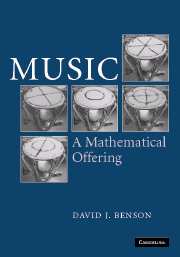Book contents
- Frontmatter
- Contents
- Preface
- Acknowledgements
- Introduction
- 1 Waves and harmonics
- 2 Fourier theory
- 3 A mathematician's guide to the orchestra
- 4 Consonance and dissonance
- 5 Scales and temperaments: the fivefold way
- 6 More scales and temperaments
- 7 Digital music
- 8 Synthesis
- 9 Symmetry in music
- Appendix A Bessel functions
- Appendix B Equal tempered scales
- Appendix C Frequency and MIDI chart
- Appendix D Intervals
- Appendix E Just, equal and meantone scales compared
- Appendix F Music theory
- Appendix G Recordings
- References
- Bibliography
- Index
8 - Synthesis
Published online by Cambridge University Press: 05 March 2013
- Frontmatter
- Contents
- Preface
- Acknowledgements
- Introduction
- 1 Waves and harmonics
- 2 Fourier theory
- 3 A mathematician's guide to the orchestra
- 4 Consonance and dissonance
- 5 Scales and temperaments: the fivefold way
- 6 More scales and temperaments
- 7 Digital music
- 8 Synthesis
- 9 Symmetry in music
- Appendix A Bessel functions
- Appendix B Equal tempered scales
- Appendix C Frequency and MIDI chart
- Appendix D Intervals
- Appendix E Just, equal and meantone scales compared
- Appendix F Music theory
- Appendix G Recordings
- References
- Bibliography
- Index
Summary
Introduction
In this chapter, we investigate synthesis of musical sounds. We pay special attention to Frequency Modulation (or FM) synthesis, not because it is a particularly important method of synthesis, but rather because it is easy to use FM synthesis as a vehicle for conveying general principles.
Interesting musical sounds do not in general have a static frequency spectrum. The development with time of the spectrum of a note can be understood to some extent by trying to mimic the sound of a conventional musical instrument synthetically. This exercise focuses our attention on what are usually referred to as the attack, decay, sustain and release parts of a note (ADSR). Not only does the amplitude change during these intervals, but also the frequency spectrum. Synthesizing sounds which do not sound mechanical and boring turns out to be harder than one might guess. The ear is very good at picking out the regular features produced by simple minded algorithms and identifying them as synthetic. This way, we are led to an appreciation of the complexity of even the simplest of sounds produced by conventional instruments.
Of course, the real strength of synthesis is the ability to produce sounds not previously attainable, and to manipulate sounds in ways not previously possible. Most music, even in today's era of the availability of cheap and powerful digital synthesizers, seems to occupy only a very small corner of the available sonic pallette.
Information
- Type
- Chapter
- Information
- Music: A Mathematical Offering , pp. 265 - 311Publisher: Cambridge University PressPrint publication year: 2006
